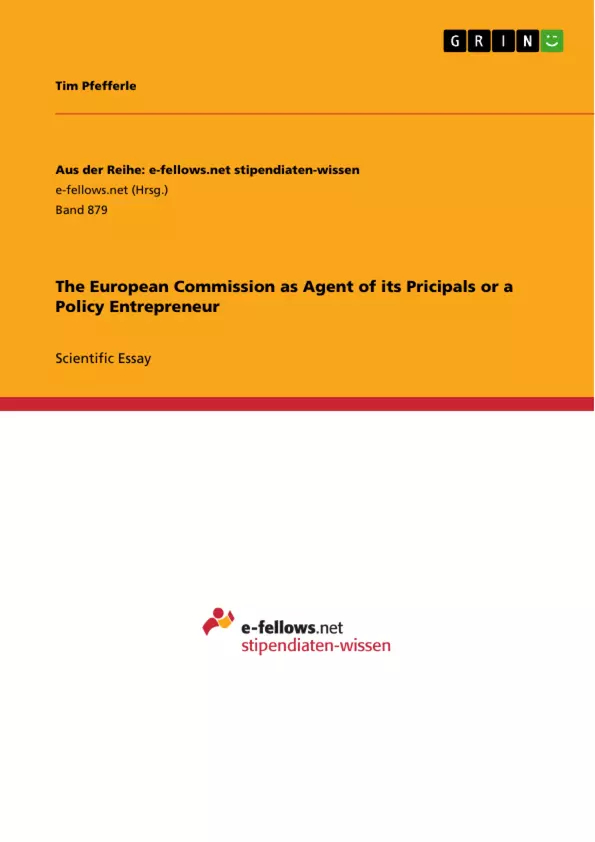This essay explores the role played by the European Commission. It examines whether the Commission can be seen as a policy entrepreneur which tries to push an idiosyncratic agenda or whether it acts as an agent of the member states, which ultimately control its scope for action.
Inhaltsverzeichnis (Table of Contents)
- Introduction
- The Commission as an Agent of the Member States
- Definitions
- The Commission's Executive Role
- The Commission's Administrative Role
- The Commission as a Policy Entrepreneur
- Definitions
Zielsetzung und Themenschwerpunkte (Objectives and Key Themes)
This paper analyzes the relationship between the European Commission and member states, specifically examining whether the Commission acts as a policy entrepreneur with its own agenda or simply as an agent fulfilling the wishes of member states. The paper draws on the principal-agent framework and the concept of policy entrepreneurship to evaluate the Commission's ability to act independently.- The role of the European Commission as an agent of the member states.
- The constraints imposed on the Commission by member states in terms of its executive and administrative functions.
- The capacity of the Commission to act as a policy entrepreneur, employing strategies to pursue its own objectives.
- The intergovernmentalist perspective on the EU, where member states retain control and the Union serves as a bargaining tool.
- The potential for the Commission to leverage its institutional advantages and knowledge to influence policy outcomes.
Zusammenfassung der Kapitel (Chapter Summaries)
Introduction
The paper investigates the relationship between the European Commission and member states, questioning whether the Commission acts as a policy entrepreneur or solely as an agent of its principals. It outlines the paper's main arguments, suggesting that while the Commission faces constraints, it possesses significant scope for independent action.The Commission as an Agent of the Member States
This section examines the relationship between the Commission and member states through the lens of the principal-agent framework. It highlights the Commission's reliance on member states for its appointment, funding, and legitimacy. The section discusses how member states can exert control over the Commission through treaty negotiations, budget control, and public opinion.The Commission's Executive Role
This section explores how member states influence the Commission's executive functions. It highlights the role of the European Council in treaty negotiations, the member states' control over the EU budget, and the Commission's dependence on public support. The section argues that these factors limit the Commission's independent action.The Commission's Administrative Role
This section examines the administrative functions of the Commission, emphasizing the member state influence on personnel selection and bureaucratic socialization. The section suggests that Commission officials, particularly those from larger member states, tend to hold intergovernmentalist perspectives, further reinforcing the member state control.The Commission as a Policy Entrepreneur
This section introduces the concept of policy entrepreneurship and its application to the Commission. It explores how the Commission can employ strategies to pursue its own objectives, potentially surpassing its role as a mere agent of the member states. The section lays the foundation for further examination of the Commission's potential for independent action.Schlüsselwörter (Keywords)
The primary keywords of the paper are European Commission, member states, principal-agent framework, policy entrepreneur, intergovernmentalism, executive functions, administrative functions, treaty negotiations, budget control, public opinion, bureaucratic socialization, institutional advantages. The paper explores the dynamics between the Commission and member states, analyzing the Commission's potential for independent action and influence within the European Union framework.Frequently Asked Questions
Is the European Commission an agent or a policy entrepreneur?
The essay explores both roles, examining if the Commission acts as a controlled agent of member states or as an entrepreneur pushing its own idiosyncratic agenda.
What is the principal-agent framework in the context of the EU?
It is a model where member states (principals) delegate powers to the Commission (agent), while attempting to control its actions through funding and legitimacy.
How do member states constrain the Commission's executive role?
Constraints include treaty negotiations by the European Council, control over the EU budget, and the influence of national public opinion.
What is the "administrative role" of the Commission?
It involves personnel selection and bureaucratic socialization, where member state influence can lead to intergovernmentalist perspectives among officials.
Can the Commission influence policy independently?
Yes, as a policy entrepreneur, the Commission can leverage institutional advantages and specialized knowledge to influence outcomes beyond its mandate.
What is the intergovernmentalist perspective on the Commission?
This view argues that member states retain ultimate control and that the EU serves primarily as a bargaining tool for national interests.
- Quote paper
- Tim Pfefferle (Author), 2013, The European Commission as Agent of its Pricipals or a Policy Entrepreneur, Munich, GRIN Verlag, https://www.grin.com/document/266929



